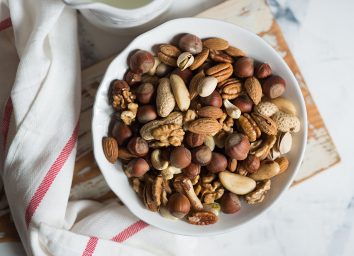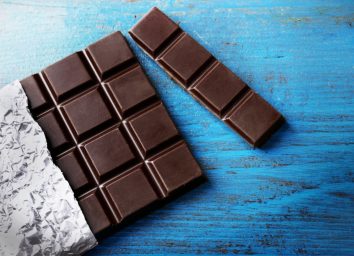9 Ways Eating Better Can Improve Your Mental Health

Although French fries and ice cream often make it on the list of grub to dig into when we’re down, true comfort food comes from a healthier crowd. Need proof? Well, Spanish researchers who followed 15,000 young adults over the course of nine years found that those who ate more nuts, fruit, vegetables, and fish had a 30 percent lower incidence of depression than those who gorged on sweets or processed foods.
Ensuring your diet is full of adequate amounts of healthy nutrients can enhance your mental clarity, provide a more balanced mood, and protect your mind from early mental decline. Discover all the ways that eating better can help improve your mental health—and when you’re finally convinced it’s time to make the change, add these best foods that boost your mood on your grocery list to get you started!
You’ll Save Money

Think about all that cash you blow on soda, grabbing takeout at restaurants, picking out a snack every couple of hours, and ordering dessert after every meal. It’s not just food you’ll save money on when you start to eat better. Those who clock in at a healthy weight spend an astounding 42 percent less cash on medical bills and health expenses than their overweight peers, according to a Health Affairs report. Sounds pretty good so far, but get this: you’ll not only be less stressed financially, but a study published in The Journals of Gerontology: Psychological Sciences and Social Sciences says that financial strain is a strong risk factor for and predictor of worsening mental health. Clear mind, full wallet, can’t lose.
Fueling Up Properly Means You Won’t Be Hangry As Much

Whether you’re constantly muttering under your breath about coworkers’ minute errors or snapping at drivers during rush hour, you go about life with a short fuse. Rather than looking to poor anger management or mood disorders, look to your rumbling stomach. You could actually be hangry! One of the reasons why you’re always hungry, and thus, always hangry, is perhaps because of an inefficient diet that subsists on empty carbs. This food burns up in your body quickly, which causes your body to crave substance more quickly.
When you deprive yourself of food while your body screams at you to eat, your body goes into a state of distress. The result is low dopamine levels—which means less control over your emotions and commonly experiencing irritability, anxiety, mental confusion, and slowness in thought. If you choose to fuel up with slow-burning sources of energy like complex carbs, protein, and healthy fats, you’ll start to see your anger subside in no time.
Combating Nutritional Deficiencies Can Improve Your Mood

Studies show that a number of nutrients are associated with brain health, and deficiencies of these nutrients have countlessly been linked to depression. It should be no surprise that many of these micronutrients are abundant in “healthy” foods and M.I.A. in junk foods. Some of which include omega-3s (salmon, flax and chia seeds, walnuts), folate (asparagus, chickpeas, lentils), vitamin B12 (tuna, shrimp, milk), choline (egg yolks, broccoli, brussels sprouts), magnesium (spinach, yogurt, black beans), vitamin D (fatty fish, eggs). Always check with your doctor before going off any anti-depressants, but you may want to get blood work done to see if the reason your mood has tanked is because you’re experiencing some nutritional deficiencies.
Eating Antioxidants Can Help You Feel More Optimistic About The Future

Whether you’re a recent college grad or just attended your last child’s college graduation, the future can certainly seem daunting at times—and that can cause some serious anxiety. That’s even more so the case if you’re not eating enough carrots. Why? A study published in the journal Psychosomatic Medicine found that individuals with higher levels of carotenoids (a type of antioxidant) tended to be more optimistic about the future, an indicator of positive health. Unless you’re always ordering sweet potato fries when you eat out, you’re likely missing out on these beneficial antioxidants. On the other hand, a healthy diet easily incorporates many of its top sources: carrots, tomatoes, sweet potatoes, and kale.
Chemicals In Fast Food Block Mood-Boosting Nutrient Absorption

It might be hard to pronounce, but phthalates (thāl-ates) are a group of endocrine-disrupting chemical toxins you need to know about. Just like BPA, phthalates are used in plastic food and beverage wrappers notorious in fast food places—but those toxins aren’t staying just on the wrappers.
A study connected people who ate fast food with dose-dependent higher levels of phthalate metabolites than infrequent eaters. And that’s bad news for all-day-breakfast lovers since a separate study published in the Journal of Clinical Endocrinology & Metabolism found that exposure to BPA and phthalates may reduce adults’ vitamin D levels—a vitamin whose low levels in the blood have been connected to mental decline in older adults and chronic migraines in young people. Bottom line: lay off the fast food and not only will the scale tip in your favor, but you may also have more mental clarity!
You’ll Kick The Junky Foods That Exacerbate Stress

Believe it or not, but the foods that worsen stress are also the ones that are connected to weight gain. Worst of all, they’re often our go-to snacks when we’re feeling particularly anxious (think: chips and ice cream), which just throws our bodies into an endless cycle of stress. On the other hand, there are numerous options that have been scientifically proven to alter both your brain chemistry and hormones to help your body deal with stress more easily. And you guessed it: they’re all good-for-you foods.
You May Boost The Effectiveness of Your Medication

Are you taking antidepressants? A study published in the American Journal of Psychiatry found that supplementing your diet with certain nutrients found in healthy foods—omega-3 fatty acids, folate, and vitamin D—can be effective in boosting the positive effects of antidepressant medication.
You’ll Sleep Better

You may have never thought about how—or if—your diet controls how easily you fall asleep and how well-rested you are upon waking. When you eat a poor diet centered on foods that digest quickly and leave you hungry often, you can disrupt your sleep cycle by making yourself hungry in the middle of the night. When you improve your diet and lose weight, you’ll likely be able to put sleeping problems such as sleep apnea to bed. In doing so, you’ll improve your mental health in the meantime.
Countless studies have found that sleeping problems often precede mental illnesses such as anxiety disorders and depression. In a widespread study of 1,000 adults, researchers found that those who reported a history of insomnia during an interview were four times as likely to develop major depression by the time of a second interview three years later. To find out which foods to nosh on at nighttime and which are disrupting your beauty rest, we rounded up the best and worst foods for better sleep.
You’ll Feel More Energized

Sometimes, you just need a boost of energy to get you feeling better, and foods that are high in vitamin C are perfect. In fact, a study in Psychopharmacology found that Vitamin C supplementation helped increase mental vigor and improved cognitive performance, stress levels, and overall mental health.








